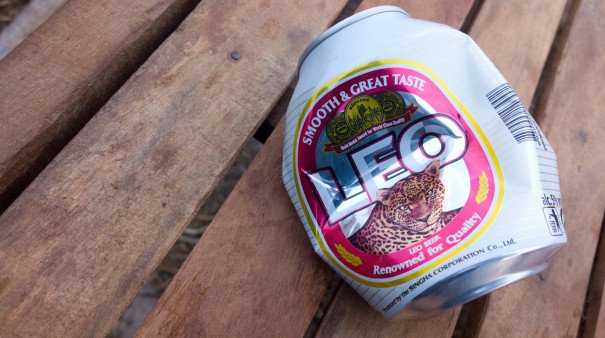
Things Take a Political Turn After the Second Beer

Things Take a Political Turn After the Second Beer
Leo Beer in Cambodia
Over the first beer, we speak about the usual things. Where is your family from? Why did you give up your job as a jungle guide? How serious is the drought?
I thought my host’s house was in Siem Reap. It was, but he relocated a couple days before I arrived. My stay became a few days in an unfinished hut: a bamboo frame, three walls, a roof, mattresses, a mosquito net. The compost toilet wasn’t functional yet, but there were bushes and trees nearby. The well water had a metallic tint. A car battery powered the house’s single light bulb after sundown, and charged my host’s Samsung smartphone.
Independent tour guides can’t find work now, he tells me. Cambodia is more likely to see visitors from China, Japan, and South Korea these days, and they tend to travel in tour groups instead of finding their own way. With dwindling income, he moved to the countryside. I still can’t pinpoint the location on a map, but it’s somewhere west of town. The plan is to start an organic farm, and maybe host a few foreigners every now and then. It’s the best way to support his wife and two children, he says.
The second beer takes a political turn. The Khmer Rouge may have disappeared, but the same guys and their protégés still run the government, only with a less genocidal bent, in suits instead of uniforms. They’re more likely to address the interests of the Vietnamese and Chinese governments, he says, instead of taking care of Cambodia. Dams are built and jungles are logged. Villagers are displaced but not compensated, so they protest, but the crackdowns hit hard and some are killed. It’s rarely mentioned because a popular broadcaster is run by the prime minister’s eldest daughter, and other media bodies face intimidation. The tycoons ship Cambodia’s organic produce to Vietnam and Thailand. In return, Cambodia’s neighbors export vegetables laced heavily with pesticides.
Four workmen continue to work on the hut as the sun inches westward. On most days, the heat dampens progress. Two work a saw as the others watch. A huge mound of dirt is piled before the hut’s open face, coating everything with a beige dust in the gentle late afternoon breeze.
We are quiet by the third beer. There is grit in our teeth. A neighbor’s plump chickens and skinny dogs brush by our legs. A few cows head home; they know their way. Kittens claw at tree bark, then ask for human attention. Our arms itch as flies land on them.
We’re drinking Leo beer, a Thai production. I ask about sraa, a traditional Khmer rice wine. “The village I am from used to have the best yeast for sraa,” my host says. The liquor used to be made by private households, and many families had their own mother culture. That is no longer the case. Corporate breweries have homogenized the drink, and people stopped making their own.
The rice paddies around us are dry. The calendar says it’s the rainy season, but none has come. The Cambodian government says the rain will be three months late. Many farmers have lost a harvest.
“When my jungle trekking business became bankrupt, and I decided to move here,“ my host says, “I only had 10 dollars in my pocket.”
It’s dark. Stars pierce through the black veil above us. Kids from a nearby farm switch on fluorescent tubes arranged around their father’s field. Crickets will hop toward the light and drown in plastic sacks placed underneath. When they collect enough, the kids will sell the bugs to street vendors in town. Before my host trekked the jungles, he worked as a cook. He saunters over to a makeshift kitchen. He can’t stop coughing. A quick slide of his blade silences loud animal cries. Dinner is chicken.